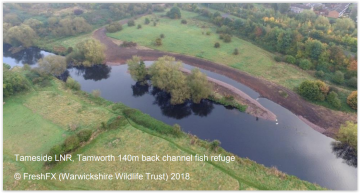Case study:Community Wetlands: Difference between revisions
No edit summary |
No edit summary |
||
| Line 41: | Line 41: | ||
|Other motivation=Landscape enhancement, | |Other motivation=Landscape enhancement, | ||
}} | }} | ||
{{Measures}} | {{Measures | ||
|Floodplain / River corridor=Creation of wetland, Scrapes, Floodplain spillways, Floodplain reconnection, water meadow creation, | |||
|Planform / Channel pattern=Reedbed creation, | |||
|Social measures=Community Education, Viewing platform, | |||
|Wider stakeholder / citizen engagement=Information provision | |||
}} | |||
{{Hydromorphological quality elements header}} | {{Hydromorphological quality elements header}} | ||
{{End table}} | {{End table}} | ||
Latest revision as of 09:42, 4 January 2019
Project overview
| Status | Complete |
|---|---|
| Project web site | |
| Themes | Habitat and biodiversity, Water quality |
| Country | England |
| Main contact forename | Tracey |
| Main contact surname | Doherty |
| Main contact user ID | User:TameValley |
| Contact organisation | Warwickshire Wildlife Trust |
| Contact organisation web site | http://http://www.tamevalleywetlands.co.uk/ |
| Partner organisations | |
| Parent multi-site project | |
| This is a parent project encompassing the following projects |
No |
Project summary
To create a new and exciting area of wetland (LBAP habitat) approximately 6 hectares in size, incorporating restoration of wet grassland, reedbed creation, extension of Hall pond, a ditch network, artificial sand martin bank and a number of scrapes which will act as a magnet for both wildlife and people.
Create an informal outdoor education area incorporating a dipping platform and raised viewing platform with steps that can be used as an outdoor classroom and a ramp access.
Incorporate three interpretation panels and two benches
The wetland will provide space and storage for flood water during extreme events and will aid flooding by slowing the flow and drainage back into the river. The reconnection of this area to the floodplain will help to enhance the wetland mosaic ensuring that wetland specialist plants thrive working towards restoration of the current low quality MG4 meadow.
Monitoring surveys and results
A phase 2 habitat survey was carried out prior to works in 2016. Areas of low quality MG4 meadow were identified and protected from earthworks. The remainder of the site was seeded in an appropriate wetland mix in April 2016. In July 2017 a bioblitz was carried out on the site and over 614 species were recorded. The meadow is improving but further enhancement of yellow rattle might be advantageous to control the grasses on the site that was originally protected from works. Seeds donated from a floodplain meadow area within Kingsbury Water Park will be used to enhance the flora further.
The Wetland works even better than anticipated filling from Mitchell's pool in the north through the ditches and flooding over the meadow and from the impoundment of the leys brook which fills the pond and dry reedbed area and then flooding over the meadow.
Lessons learnt
Image gallery
|
Catchment and subcatchment
Site
Project background
Cost for project phases
Reasons for river restoration
Measures
MonitoringHydromorphological quality elements
Biological quality elements
Physico-chemical quality elements
Any other monitoring, e.g. social, economic
Monitoring documents
Additional documents and videos
Additional links and references
Supplementary InformationEdit Supplementary Information
| ||||||||||||||||||||||||||||||||||||||||||||||||||||||||||||||||||||||||||||||||||||||||||||||||||||||||||||||||||||||||||||||||||||||||||||||||||||||||||||||||||||||||||||||||||

